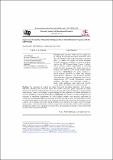Please use this identifier to cite or link to this item:
http://hdl.handle.net/11547/11374Full metadata record
| DC Field | Value | Language |
|---|---|---|
| dc.contributor.author | Bayram, Hale | - |
| dc.date.accessioned | 2024-03-21T07:58:35Z | - |
| dc.date.available | 2024-03-21T07:58:35Z | - |
| dc.date.issued | 2017 | - |
| dc.identifier.uri | http://hdl.handle.net/11547/11374 | - |
| dc.description.abstract | Purpose: This study aimed to ascertain misconceptions of students about basic physical concepts in the Force and Motion unit of secondary school seventh class curriculum, to eliminate the misconceptions with created argument environment and traditional approaches after evaluated, and categorize these misconceptions in an ontological sense. Research Methods: Considered fundamental problems and sub-problems for which answers are sought. A semi-experimental model with pre-test and post-test control groups was utilized. Detected ontological categories were analyzed and discussed for each question located in the Force and Motion concept test. Findings: Before and after applications after physical concepts about the Force and Motion unit were examined and categorized ontologically. 301 examined misconceptions from students in the experimental group arose from placement in the higher category. 150 misconceptions that arose from the placement in the lateral category were identified before application. 252 misconceptions of the 301 misconceptions (83.72%) that arose from placement in the higher category were corrected due to argumentation works that were executed. 128 misconceptions out of 150 (85.33%) misconceptions that were placed in the lateral category were corrected after an argumentation analysis. Implications for Research and Practice: Studies such as determination, evaluation, and correction of misconceptions should be performed by using ontological categories. This study shows that the implementation of argumentation works is more successful in the elimination of misconceptions placed in constraint-based interactionnatural, random-event, and matter categories. In this way, learning environments can be designed to be more efficient and infallible. (C) 2017 Ani Publishing Ltd. All rights reserved | tr_TR |
| dc.language.iso | en | tr_TR |
| dc.relation.ispartofseries | 69; | - |
| dc.subject | STUDENTS | tr_TR |
| dc.subject | KNOWLEDGE | tr_TR |
| dc.title | Eliminate with Created Argument Environment after Evaluated and Categorized Misconceptions in an Ontological Sense | tr_TR |
| dc.type | Article | tr_TR |
| Appears in Collections: | Web Of Science | |
Files in This Item:
| File | Description | Size | Format | |
|---|---|---|---|---|
| 1-EJER+1314_indonesia_Ready+to+print_approved.pdf | 500.63 kB | Adobe PDF |  View/Open |
Items in DSpace are protected by copyright, with all rights reserved, unless otherwise indicated.
